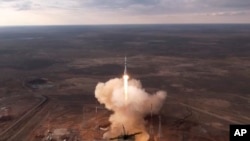Marina Vasilevskaya, Belarus' first woman cosmonaut, was aboard a Russian Soyuz spacecraft that blasted off Saturday headed for the International Space Station, Moscow's Roscosmos space agency said.
"The Soyuz took off from Baikonur" in Kazakhstan at 1236 GMT, a Roscosmos statement said, adding that the spacecraft went into orbit "as planned."
Initially programmed for Thursday, the take-off was delayed on the launchpad at the last moment in another high-profile setback for Russia's space program that has been hit by financial problems, scandal, corruption and failure.
Roscosmos chief Yuri Borisov said a "voltage dip" had occurred in a chemical power source during final pre-launch preparations.
But on Saturday the Soyuz MS-25 mission took off from the Baikonur spaceport without apparent problems carrying three astronauts — experienced Russian cosmonaut Oleg Novitsky, Tracy Dyson from the United States and the 33-year-old Vasilevskaya.
"Everything is fine on board," Novitsky said shortly after lift-off in a video broadcast by Roscosmos.
The Soyuz craft was due to dock on Monday with the Russian segment of the International Space Station, or ISS.
Moscow's once-pioneering space program has faced multiple setbacks since it won the first leg of the space race more than 60 years ago.
The program has suffered since the collapse of the Soviet Union, including with the loss of its first lunar probe in almost 50 years last August.
The Russian segment of the ISS also suffered three coolant leaks in under a year, spraying flakes of frozen coolant into space on multiple occasions in 2023.
Space is one of the final areas of U.S.-Russia cooperation amid an almost complete breakdown in relations between Moscow and Washington over the last two years.
But Russia has said it plans to ditch the ISS and build its own space station.
It previously said it would quit "after 2024," but the most recent position is that Russia will remain a participant until 2028.
For almost a decade, Russian Soyuz launches were the only way to ferry astronauts between Earth and the ISS, after NASA halted its Space Shuttle program.
But the United States has now moved to using privately built SpaceX rockets and capsules, ending Russia's monopoly on crewed launches.









